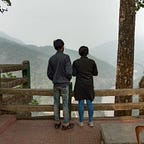Bukowski’s God Fante and Us: A Rendezvous
Written by: Sourima Chakraborty
I remember that sluggish afternoon when we were looking at a list of books that influenced Charles Bukowski. It was a warm winter, and we were sitting on a light wooden bench that was quite prone to toppling over if one wasn’t cautious. Funnily enough, I’d been working two jobs at the same time, I, who had been quite unsuccessfully groping to find the motivation to do anything at all for the last few years. And no wonder I’d quit from both the places on the same day, which was just a few days prior to our afternoon in question.
Left without the certainty of an income, I became more aware of the fact that my days on Earth were numbered. Would it be too direct to say that I felt like I was on parole? It was either a pressing, pulsating reality, or it was a holding of breath, tightening of pelvic floor kind of feeling. I knew that I had to make a living in this world, in order to, well, live. But, at the same time, I was utterly and unabashedly confused about what I wanted to do like it was the most natural thing in the world. So, we, perhaps, took some comfort in the image of a haggard, starving, desperately drunk Bukowski, scouring works of insipid, esoteric, literature, in the consecration of a public library, only to be bowled over by the feistiness of this book called Ask the Dust, by a fellow American writer, John Fante.
Now, I’d never heard of this author, or this book, but only a few minutes into the first chapter caused our laughter, and the words ‘Arturo Bandini’ to resound through the languid calm we were in the midst of. The text was, indeed, as full of this main character, as he was of himself, and what could be funnier than the self-assertiveness of another man, in the shadow of our own? We read a few chapters that day and did not pick up the book again for quite some time. But, every time the name Arturo Bandini was tossed around (deliberately), a sardonic smile would color our lips.
Another day, the kind of day on which one feels like one is the slow-cooked chicken in a bubbling broth, the broth scalding hot, the hours terrifyingly slow, we picked up the book again. Not much time had passed, but we were different persons, all the same. We read aloud to each other, our words interspersed with little snorts, and fits of laughter. The afternoons were somber, but the leaden evenings brought along a broke and hungry kind of freedom.
‘What is this Arturo Bandini?’ I’d often wonder. Is he a communist, or a socialist, or an atheist, or an anarchist, surely not a feminist? Is a man even allowed to be so full of contradictions, so righteous, yet so self-effacing at the same time? And, are these innumerable contradictions of man what makes a novel… a novel?
Halfway through, I realize that it is a love story. Quite a racist, or a racial love story. An oddly wrong love story. A perfectly right love story.
‘My advice to all young writers is quite simple. I would caution them never to evade a new experience. I would urge them to live life in the raw, to grapple with it bravely, to attack it with naked fists.’, says Bandini in one of his make-believe interviews. And I think about how I’d wanted to be a writer all along, but never had a stomach for life, never had a taste for the madness of it.
But, perhaps, what is most exquisite is the flux — the flux of Bandini’s daydreams, his resentments, his sentiments, his desires, the flux of the ever-changing vicissitudes of the book, the rawness of which holds up a mirror to the fog of humanity.
So, I guess when Bandini writes his beloved’s name in his magazine and throws it into the desert, I could feel the momentum of the gliding object in my heart.
For further reading, refer to this splendidly written tribute to Ayn Rand’s Atlas Shrugged by Mary Lou Heater
